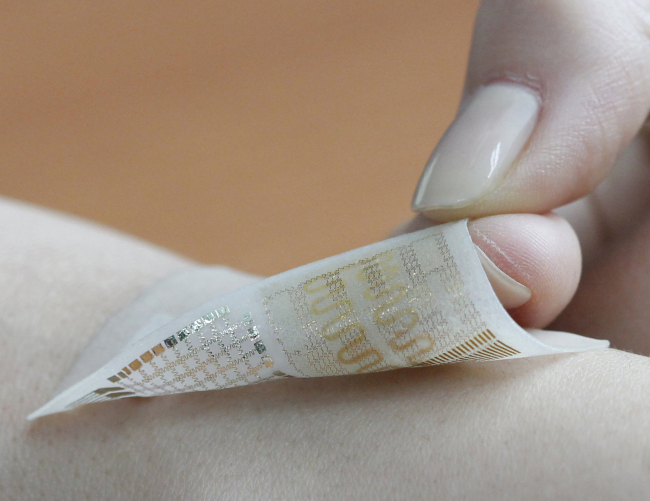A team of Korean researchers have given new meaning to wearable devices with their development of a “smart skin” ― a medical patch applied to the skin capable of monitoring Parkinson’s disease.
The patch can also read body movements, and even administer drugs to a patient wearing it.
“The medical patch we developed can monitor patients with Parkinson’s disease and dose them automatically with drugs based on the level of their illness,” said Kim Dae-hyeong, professor at Seoul National University’s school of chemical and biological engineering.
 |
Kim Dae-hyeong, a professor at Seoul National University’s school of chemical and biological engineering. ( SNU) |
 |
A smart medical patch for treating Parkinson’s disease developed by a research team led by Kim Dae-hyeong. (SNU) |
“The amount of drugs dispensed varies according to the severity of patients’ condition in order to prevent an overdose,” he added.
The smart skin was created with the short-term goal of more effectively treating the disease, but in the longer term, it might work to treat other brain dysfunctions.
Kim first came up with the idea of a dermal sensor for monitoring Parkinson’s in 2012, and published an article about the flexible skin patch in Science, an international science magazine.
The smart patch is fitted with a monitoring sensor, a type of computer memory called resistive random-access memory, and stretchable heaters. The bottom of the patch is coated with silica nanoparticles that contain drugs.
The monitoring sensor picks up signals caused by a patient’s tremors, and the heater embedded within the wearable patch warms up to eventually separate the drugs from the nanoparticles to be dissolved into the skin.
“I think that the latest smart patch, when fully developed, will be able to help those who suffer from behavioral disorders and other movement disorders,” the professor said.
He said it would take at least several more years to commercialize the patch, but with tech giants’ involvement, it may take less.
Samsung Electronics and LG Electronics are currently said to be working on smart skin products, meaning the patches may reach the public sooner than expected.
Kim said he would try to make a smart patch that could be powered by flexible batteries, with a wireless connection that can connect it to smartphones and other devices.
The researcher is also currently conducting research to develop smart skin products that can monitor and diagnose other diseases.
International Data Corporation, a global research institute, forecasted in its April report that shipments of wearable devices including smart watches and smart bands would exceed 19 million in 2014 and increase to 111.9 million units in 2018.
Kim was picked as one of the world’s 35 young innovators who will change the world through innovation by Technology Review a magazine published by Massachusetts Institute of Technology in 2011.
By Kim Young-won (
wone0102@heraldcorp.com)









